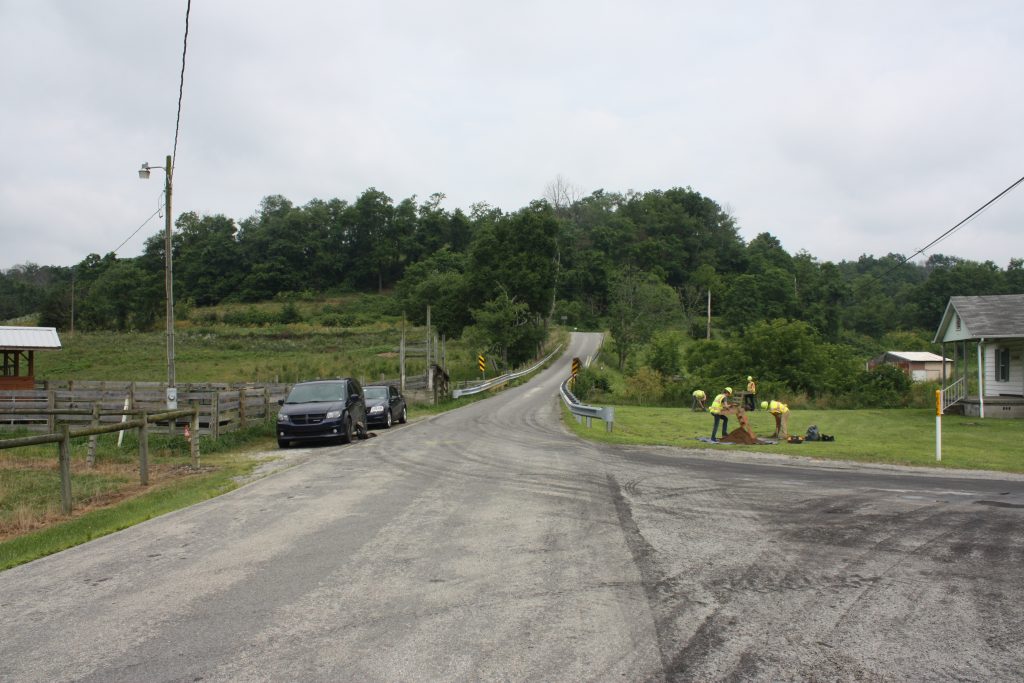Each summer, PennDOT hires a field crew to gain experience running archaeological surveys as part of the environmental clearance for PA’s multitude of transportation-related construction projects. PHAST (PennDOT’s Highway Archaeological Survey Team) is supervised by an IUP graduate student enrolled in the Applied Archaeology MA program – that’s me. This year’s PHAST crew is comprised of three IUP grad students: Genevieve Everett, Sami Taylor, and Zaakiyah Cua. The intricacies of completing archaeological field work in a cultural resource management (CRM) setting can be difficult to fully grasp in a classroom setting, and PHAST allows students to gain valuable working experience and hone their field skills.
Covering the entire state of Pennsylvania, the PHAST crew has a wide variety of projects. The project list and schedule are in a constant state of flux, and the unpredictability of CRM work is readily apparent. Jobs scheduled for a whole week of field work may be completed ahead of schedule if no archaeological sites are found, or if the project area has already been disturbed by modern activity. Similarly, jobs scheduled for a day of work may stretch on for weeks if a site is encountered, or if testing goes especially deep (our .57-cm diameter shovel test occasionally reach a depth of 1-meter before we encounter an appropriate stopping point). CRM work forces you to constantly reassess the situation based on new information, from the planning stages to the actual field work.
This summer started off with a bang. We encountered a prehistoric lithic reduction site on our first project, located in Allegheny County near Chartiers Creek. Within a single 1m x 1m test unit, we recovered over 500 lithic artifacts – mostly flaking debris and cores associated with the production of stone tools. Encountering sites is exciting, but not a daily occurrence in CRM archaeology, as many of our projects since then attest to. Of the 11 projects we’ve completed field work for, only 3 contained sites.
As busy as we’ve been traveling across the state from the Southwestern corner near Prosperity, PA to State College in the Center, and down to Muddy Creek Forks in Southern York County, it’s no wonder the summer is flying by. Helping out at the Hatch Site (see July 3 blog) for three weeks was the longest we’ve been in the same spot, and gave us a rare CRM opportunity to work on a full-scale data recovery project at a known archaeological site.
Nearing our final month of field work we have 4 projects that need to be completed. Two consist of the standard survey method of shovel testing the project areas for bridge replacements in Jefferson and Washington Counties, while the other two are Ground-Penetrating Radar (GPR) surveys to try and locate a French-Indian War Fort in Lehigh County and out-buildings associated with one of the homes in Old Economy Village. There’s always the potential that a few small projects will pop-up before the end of August when classes start and the PHAST crew moves indoors to focus on the lab work, curation, and report writing. The crew will be employed by PennDOT through the end of October, but I’ll remain the PHAST director until May of 2019 when I graduate – stay tuned for more updates!
Visit the IUP Anthropology Department


Really nice summary and description of what CRM fieldwork is like. Sounds like you had a great summer. Thanks for bringing back memories of my fieldwork days. 🙂